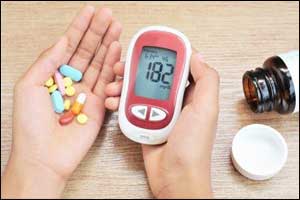- Home
- Editorial
- News
- Practice Guidelines
- Anesthesiology Guidelines
- Cancer Guidelines
- Cardiac Sciences Guidelines
- Critical Care Guidelines
- Dentistry Guidelines
- Dermatology Guidelines
- Diabetes and Endo Guidelines
- Diagnostics Guidelines
- ENT Guidelines
- Featured Practice Guidelines
- Gastroenterology Guidelines
- Geriatrics Guidelines
- Medicine Guidelines
- Nephrology Guidelines
- Neurosciences Guidelines
- Obs and Gynae Guidelines
- Ophthalmology Guidelines
- Orthopaedics Guidelines
- Paediatrics Guidelines
- Psychiatry Guidelines
- Pulmonology Guidelines
- Radiology Guidelines
- Surgery Guidelines
- Urology Guidelines
Type 2 diabetes: Oral Semaglutide does not increase CVD risk

Canada: Oral semaglutide does not increase cardiovascular risk in patients with type 2 diabetes, according to a recent study published in The New England Journal of Medicine. Oral semaglutide is the first oral formulation of a glucagon-like peptide-1 (GLP-1) receptor agonist developed for the treatment of type 2 diabetes.
According to the study, the cardiovascular risk profile of oral semaglutide was not inferior to that of placebo. The researchers found that the rates of cardiovascular death and death from any cause were significantly lower in the semaglutide group than the placebo group.
The Type 2 diabetes is a global epidemic that is expected to affect over 592 million people globally by 2035, a dramatic increased from 382 million people with diabetes mellitus in 2013, a prevalence that is likely to be underestimated. High blood sugar in diabetics can damage blood vessels and heart, putting the patients at higher risk for heart attack and stroke.
In light of this, it becomes important to establish the cardiovascular safety of new therapies for type 2 diabetes. Safety data are available for the subcutaneous form of the glucagon-like peptide-1 receptor agonist semaglutide but are needed for oral semaglutide. Mansoor Husain, Toronto General Hospital, Toronto, Canada, and colleagues assessed cardiovascular outcomes of once-daily oral semaglutide in an event-driven, randomized, double-blind, placebo-controlled trial involving 3183 patients at high cardiovascular risk (age of ≥50 years with established cardiovascular or chronic kidney disease, or age of ≥60 years with cardiovascular risk factors only). The patients were randomly assigned to receive oral semaglutide or placebo. The median time in the trial was 15.9 months.
The primary outcome in a time-to-event analysis was the first occurrence of a major adverse cardiovascular event (death from cardiovascular causes, nonfatal myocardial infarction, or nonfatal stroke). The trial was designed to rule out 80% excess cardiovascular risk as compared with placebo.
Also Read: Semaglutide reduces cardiac events in high risk diabetics: PIONEER 6 trial
Key findings include:
- Major adverse cardiovascular events occurred in 61 of 1591 patients (3.8%) in the oral semaglutide group and 76 of 1592 (4.8%) in the placebo group.
- Results for components of the primary outcome were as follows: death from cardiovascular causes, 15 of 1591 patients (0.9%) in the oral semaglutide group and 30 of 1592 (1.9%) in the placebo group; nonfatal myocardial infarction, 37 of 1591 patients (2.3%) and 31 of 1592 (1.9%), respectively; and nonfatal stroke, 12 of 1591 patients (0.8%) and 16 of 1592 (1.0%), respectively.
- Death from any cause occurred in 23 of 1591 patients (1.4%) in the oral semaglutide group and 45 of 1592 (2.8%) in the placebo group.
- Gastrointestinal adverse events leading to discontinuation of oral semaglutide or placebo were more common with oral semaglutide.
Also Read: Semaglutide manages diabetes and weight better than other GLP-1 receptor agonists
"In this trial involving patients with type 2 diabetes, the cardiovascular risk profile of oral semaglutide was not inferior to that of a placebo," wrote the authors.
"A larger, longer-term clinical trial (oral SOUL) is underway and will likely provide more conclusive data. For now, clinicians can be confident that oral semaglutide does not raise cardiovascular risk and that there is some evidence that it may even reduce cardiovascular and all-cause mortality," they concluded.

Disclaimer: This site is primarily intended for healthcare professionals. Any content/information on this website does not replace the advice of medical and/or health professionals and should not be construed as medical/diagnostic advice/endorsement or prescription. Use of this site is subject to our terms of use, privacy policy, advertisement policy. © 2020 Minerva Medical Treatment Pvt Ltd